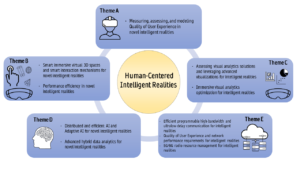Introduction
Digitalization is part of everyone’s lives, and during the last decade, we have seen technologies such as augmented reality (AR), virtual reality (VR), and extended reality (XR) develop. Further, there has been a tremendous development in artificial intelligence (AI) and machine learning (ML). These two trends will have an enormous impact on future digital societies, and the vision of an immersive, ubiquitous, and intelligent virtual space opens new opportunities for creating an enhanced digital world in which the users are in the center, so-called intelligent realities.
The ‘Human-Centered Intelligent Realities’ (HINTS) profile aims to develop concepts, principles, methods, algorithms, and tools for human-centered intelligent realities, in order to lead the way for future immersive, user-aware, and smart interactive digital environments. The project is centered around an ecosystem that combines the virtual-reality continuum paradigm and the communication-computing continuum paradigm to form a novel intelligent digital system.
Mission Statement
“Be a leading site in Sweden and an internationally recognized environment in future digital human-centered intelligent realities.”
Core Question
How shall we design effective, efficient, and distributed analytical and computational methods for human-centered intelligent realities?
Overall Objective
In co-production with industrial partners and society, develop concepts, principles, methods, algorithms, and tools for human-centered intelligent realities, in order to lead the way for future immersive, user-aware, and smart interactive digital environments.
Description of Research Profile
HINTS aims at being the main Swedish node with a high international impact in human-centered intelligent realities for the next-generation digital societies. The project seeks scientific breakthroughs in five interrelated strategic research areas of human-centered intelligent realities: novel experience assessment methodologies, novel environments and interaction techniques, visual analytics, adaptive and distributed AI, and networking. The needs of our industrial partners are grouped into seven industrial challenges. Based on these challenges, five research themes are defined with their own core questions, and in combination, they will address the overall aims of HINTS:
- Research Theme A: Novel Experience Assessment Methodologies for Intelligent Realities
- Research Theme B: Novel Environment and Interaction Techniques for Intelligent Realities
- Research Theme C: Visual Analytics for Intelligent Realities
- Research Theme D: Adaptive and Distributed AI for Intelligent Realities
- Research Theme E: Networking for Intelligent Realities

HINTS will provide users with new ways to understand, collaborate with, and control digital systems. These novel ways are based on visual and data-driven platforms which enable tangible, immersive cognitive interactions within real and virtual realities. Thus, making the use of digital systems in a more efficient, effective, engaging, satisfying, and resource-aware way. Moreover, the systems will be equipped with cognitive features based on AI and ML. The new platforms should allow users to engage with digital realities and data in novel ways.
The HINTS profile builds upon previous successful projects and has a strong mix of competences and high seniority, including seven full professors, four associate professors, four researchers with a Ph.D. degree, and additionally a number of Ph.D. students. The profile has well-defined plans for recruitment, publication and dissemination, and internationalisation. New positions will also appear as part of the research profile, such as four Ph.D. positions, three postdoctoral research positions, as well as two senior lectureships. The mix of competences gives unique possibilities to develop new knowledge in the profile area. The profile includes a well-defined career advancement program and a visiting researcher program.
The research profile is financed by the Knowledge Foundation during 2022-2028. There are six companies currently involved in the research profile.
